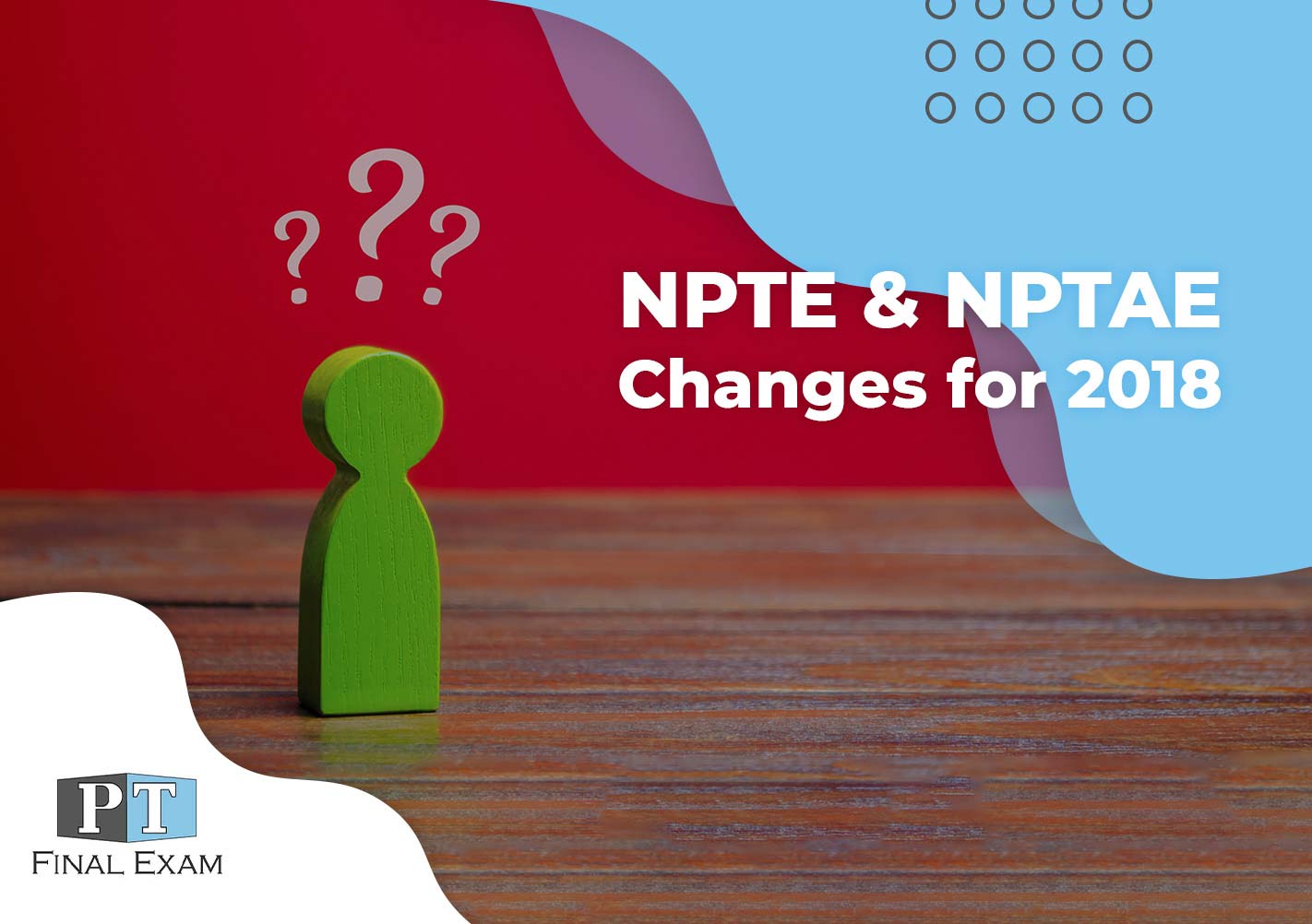 Here’s a quick update of the direction that the FSBPT is taking with regards to the NPTE and NPTAE in 2018 and going forward.
Here’s a quick update of the direction that the FSBPT is taking with regards to the NPTE and NPTAE in 2018 and going forward.
Content Outline Updates
Approximately every 5 years, the FSBPT goes through an extensive survey process to make sure that the content of the exam is relevant to current practice in the United States. This involves gathering data from thousands of clinicians across the country and the practice continuum.
The previous update to the content outline was in 2013 and reflected a significant change to the content areas represented on the exam. The 2018 update seems to be very minor compared to previous content outline changes.
Although the FSBPT has not released the 2018 content outline yet, they have announced that there will be some minor changes that will appear on the NPTE and NPTAE in 2018. Among them include:
- Separation of the Lymphatic system into its own category. Currently, it is lumped into the Cardiovascular and Pulmonary Systems with a total of 33 questions among the three systems. This total will not change much, but there will be a designated number of lymphatic questions.
- Addition of a small number of questions (TBA) for the gastrointestinal system
As always, it is important to stay up to date on the current content outline so that you can be certain that you are getting the most out of your studies!
I highly recommend you check out a previous post on the structure of the multiple-choice questions (MCQ’s) for the NPTE.
As always, I’m very proactive about implementing content changes so that you can be confident in my material. Because it’s all online, it can be quickly updated.
2018 Eligibility Requirements
As always, candidates are required to be graduates of CAPTE accredited programs or demonstrate equivalent education. For students in the USA, this is a straight-forward process.
For candidates that are foreign-trained, it can be a bit more difficult to demonstrate equivalent education from their home country. The FSPBT requires candidates to fill out Coursework Took to verify education. More can be found on the CWT here: https://www.fsbpt.org/FreeResources/CredentialingOrganizationsforNonUSCandidates.aspx
Foreign-educated physical therapists must also demonstrate English proficiency by achieving minimum scores on the Test of English as a Foreign Language (TOEFL). Some states have higher standards (check with your own state board to verify), but the FSBPT minimums are as follows:
| TOEFL Section | Minimum Score |
| Reading | 21 |
| Listening | 18 |
| Writing | 24 |
| Speaking | 26 |
In addition, the lifetime limit continues to apply. In 2016, the FSBPT implemented a 6-time lifetime limit for attempts on the NPTE and NPTAE respectively. This means that candidates who have taken either exam 6 times are ineligible for future attempts without special approval.
The FSBPT also implemented the 2-time “Low Score” rule. This rule states that candidates who receive 2 very low scores (<400) will not be allowed to test again. A score of 400 or less is a chance-level score, meaning that you could guess on every question and still get 400. This was created to limit unqualified individuals from taking the exam with the intent of distributing test questions to others (and other forms of cheating).
How to Appeal for Another NPTE Attempt
With the creation of the 6-time lifetime limit, there are many candidates who may need to appeal for another exam attempt. These appeals are initiated by the individual candidate but must be completed and submitted by the state board of PT. To appeal for an addition exam attempt, a candidate must:
- Download and complete the Appeals Form.
- Submit the form and required documentation to the state where you are seeking licensure.
- The state board then determines whether they will submit the appeal to the FSBPT.
- Appeals to the FSBPT will be reviewed within 30 days of submission, and the candidate will be notified of the result of the appeal.
- The candidate will then have 1 year to complete 1 additional attempt.
As you can imagine, when submitting the appeal, it is imperative that the candidate demonstrates to the board why another attempt should be granted. This often includes serious remediation, additional coursework, and additional clinical experience.
Conclusion
If you stay up to speed with the most current content outline and use your attempts wisely, the NPTE and NPTAE are merely stepping stones rather than stumbling blocks.
Please comment if you have any specific requests you would like to see in my courses for 2017!

